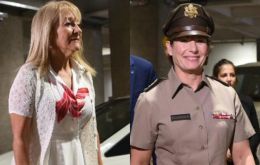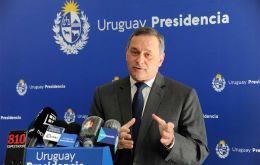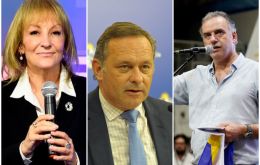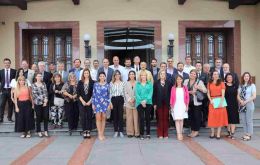MercoPress. South Atlantic News Agency
Tag: Carolina Cosse
-
Saturday, August 23rd 2025 - 09:37 UTC
Uruguay marks centenary of Legislative Palace with new LED lighting

Montevideo inaugurated on Friday a modern lighting system for the Legislative Palace as part of the celebrations marking the building’s 100th anniversary. More than 250 LED lights have been installed on the exterior, featuring energy-efficient technology and automated control.
-
Monday, November 25th 2024 - 11:19 UTC
Yamandú Orsi elected President of Uruguay, marking left's return to power

Uruguay has elected Yamandú Orsi of the Frente Amplio (FA) as its next president, bringing the left back to power after five years of conservative rule. Orsi secured 49.8% of the vote against 45.9% for Álvaro Delgado of the National Party, a margin of 92,000 votes, according to official results. The outgoing president, Luis Lacalle Pou, promptly congratulated Orsi, stating he was ready to facilitate a smooth transition.
-
Wednesday, October 2nd 2024 - 09:48 UTC
Orsi and Cosse reach out to Uruguayan voters living in Argentina

Uruguay's presidential hopeful Yamandú Orsi of the Broad Front (Frente Amplio - FA) and his running mate Carolina Cosse were in Buenos Aires this week in a campaign maneuver seeking to lure residents in neighboring Argentina to “cross the pond” and vote for him in the Oct. 27 elections.
-
Friday, June 28th 2024 - 10:56 UTC
Uruguay’s internal elections: Key players and possible outcomes

As the internal elections for Uruguay’s major political parties approach next Sunday, the consulting firm Opción Consultores has released a public opinion report evaluating the potential impact of voter turnout on the outcomes for the Frente Amplio (FA), Partido Nacional (PN), and Partido Colorado (PC). The report, released this Thursday, provides a detailed analysis of how varying levels of voter participation could influence the percentage of votes each pre-candidate might receive.
-
Tuesday, March 5th 2024 - 10:30 UTC
Uruguay: FA contenders launch presidential bids

The two main contenders for the primaries of Uruguay's opposition Broad Front (Frente Amplio - FA) have launched their bids to succeed Luis Lacalle Pou at the Executive Tower. To do this, frontrunner Yamandú Orsi resigned as mayor (governor) of Canelones while Carolina Cosse is on leave as mayor of Montevideo until July 8.
-
Thursday, February 8th 2024 - 10:54 UTC
Montevideo Mayor Cosse holds talks with General Richardson

Montevideo Mayor Carolina Cosse met Wednesday with US Southern Command Chief General Laura Richardson. Cosse, who is running in the opposition Frente Amplio (Broad Front - FA) primaries for the upcoming presidential elections, said her encounter with the visiting military officer was “of an official nature.”
-
Sunday, November 19th 2023 - 15:14 UTC
Uruguay: pre-candidates for presidency announced

Uruguay's Presidential Secretary Álvaro Delgado of the ruling Multicolor coalition and specifically from within the Aire Fresco movement of the Nationalist Party (White), announced Saturday that he would be resigning his job to focus on his bid to become the next head of state of a country where back-to-back reelection is not allowed.
-
Monday, May 15th 2023 - 10:50 UTC
Shortage of drinking water in Montevideo getting critical

Montevideo Mayor Carolina Cosse will ask the National Emergency System (Sinae) to step in as the shortage of drinking water in the Uruguayan capital gets more and more serious. The city and the Metropolitan area is feared to run out of drinking water in between 20 to 30 days due to lack of rainfall.
-
Friday, March 24th 2023 - 10:46 UTC
IMF explores possible political scenarios with Uruguayan presidential candidates

The annual monitoring mission of the International Monetary Fund (IMF) recently concluded its nearly two-week visit to Montevideo, providing a positive assessment of Uruguay's economy and the government's reform efforts. However, the mission also gauged the pulse of Uruguay's political landscape ahead of the 2024 elections, weekly newspaper Búsqueda informed.
-
Wednesday, March 22nd 2023 - 10:21 UTC
Montevideo hosts Mercociudades convention

Montevideo Mayor Carolina Cosse Tuesday welcomed dignitaries from over 20 cities from Mercosur and also from Chile for the first Mercociudades meeting of the year which the Uruguayan capital is hosting.
